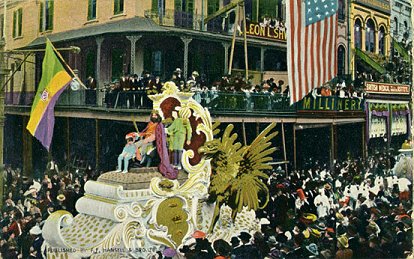Rex parade
|
|
Rex (founded 1872) is a New Orleans Carnival Krewe which stages the city's largest parade on Mardi Gras Day. Rex is Latin for "King", and Rex reigns as "The King of Carnival".
Frognap0.jpg
Rex was organized by New Orleans business men in part to put on a spectacle in honor of the New Orleans visit of Grand Duke Alexis of Russia during the 1872 Carnival season. Also in the minds of the founders of Rex was the desire to lure tourism and business to New Orleans in the years after the American Civil War.
The Rex parade is put on by an organization called The School of Design. The organization is related to the private New Orleans men's club The Boston Club.
One member of the Rex Organization is each year chosen to be the monarch of the organization; he is often incorrectly referred to by the (technically redundant) phrase "King Rex". The correct title is simply "Rex". The identity of Rex is made public on Lundi Gras, the day before Mardi Gras. Rex is always a prominent person in the city, one who is usually involved in several philanthropic and civic causes. Being chosen Rex is one of the highest civic honors a person can receive in New Orleans. The Mayor of New Orleans traditionally hands over a symbolic Key to the City of New Orleans to Rex for Mardi Gras Day.
A consort is also chosen each year for Rex, and she is titled the "Queen of Carnival". The queen is almost always a debutante, attending college. Like Rex, the queen is chosen in the spring of the previous year, and must keep her identity secret until Lundi Gras.
While historically restricted to people of European ancestry for most of its history, Rex had no trouble complying with the 1991 anti-segregation ordinances which ended the parades of the Mystick Krewe of Comus (see). The first Rex (businessman Louis Solomon) was Jewish, although for a number of years in the early 20th century Rex prohibited entrance into the organization of any new Jewish members.
Rex has held more parades in New Orleans than any other organization. It's official song is "If Ever I Cease to Love", a quirky tune from the 1870s musical "Bluebeard". This was adopted because the Grand Duke Alexis of Russia had a fondness for the actress who sang the song in the musical, which was playing in New Orleans at the time of the first Rex parade in 1872. It has stuck around since then and is played often during Carnival.
Rex is categorized as one of the four New Orleans "Super Krewes" for the very large size of the parade; the others (Endymion, Bacchus, and Orpheus) were all founded in the 2nd half of the 20th century and parade during nights in the days leading up to Mardi Gras. Rex is the only 19th century krewe and the only "super krewe" to parade during the daytime.
The Rex parade has long been known for very finely and artistically built floats. Many consider the Rex parade to be the highlight and most beautiful sight of New Orleans carnival. If one looks closely at some of the Rex floats, they are built on old cotton wagons, their wooden wheels leaving scratch marks on the pavement.
In addition its famous parade, the Rex Organization also holds a private ball for its membership and invited guests on Mardi Gras night. In the 1950s, this ball made headlines when the Duke and Duchess of Windsor bowed down to Rex and the Queen of Carnival.
In recent decades, the Rex ball is held on one side of the Municipal Auditorium, while on the other half of the building at the same time, the Mistick Krewe of Comus (the oldest krewe), holds its ball. A rich tradition is that Comus (the monarch), extends an invitation to Rex and his queen to join him and his consort at the Comus ball. This is called the "Meeting of the Courts", and when the monarchs have all made their exits, the Captain of Comus literally closes the curtain on the Carnival season. This event is televised live locally (and to selected areas outside of the city) - and many New Orleanians stay up to watch - despite their weariness - the very end.

Rex, 1904, on Canal Street, New Orleans
Missing image
KingOfCarnival.jpg
Image:KingOfCarnival.jpg
Rex, 1907 (?)
